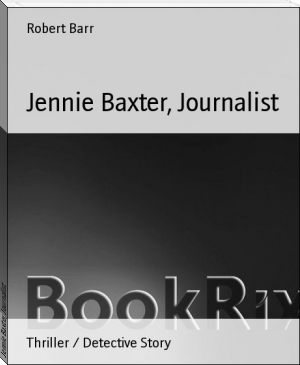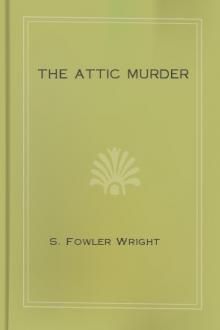Jennie Baxter, Journalist - Robert Barr (novels in english .TXT) 📗

- Author: Robert Barr
Book online «Jennie Baxter, Journalist - Robert Barr (novels in english .TXT) 📗». Author Robert Barr
hands, spreading them out and bowing. It was plainly apparent that his seeming discourtesy caused him deep regret. He was about to speak, but the Princess went impetuously on.
"Is the Director of Police a friend of yours, Herr Feltz? I don't mean merely an official friend, but a personal friend?"
"I am under many obligations to him, your Highness, and besides that, like any other citizen of Vienna, I am compelled to obey him when he commands."
"What I want to learn," continued the Princess, her anger visibly rising at this unexpected opposition, "is whether you wish the man well or not?"
"I certainly wish him well, your Highness."
"In that case know that if my friend leaves this shop without seeing the analysis of the material she brought to you, the Director of Police will be dismissed from his office to-morrow. If you doubt my influence with my husband to have that done, just try the experiment of sending us away unsatisfied."
The old man bowed his white head.
"Your Highness," he said, "I shall take the responsibility of refusing to obey the orders of the Director of Police. Excuse me for a moment."
He retired into his den, and presently emerged with a sheet of paper in his hand.
"It must be understood," he said, addressing Jennie, "that the analysis is but roughly made. I intended to devote the night to a more minute scrutiny."
"All I want at the present moment," said Jennie, "is a rough analysis."
"There it is," said the chemist, handing her the paper. She read,----
Calcium
29 Iron
4 Quartz ]
Feldspar ]
27 Mica ]
Gold 36-1/2
Traces of other substances 3-1/2
-------
Total 100
Jennie's eyes sparkled as she looked at the figures before her. She handed the paper to the Princess saying,--
"You see, I was right in my surmise. More than one-third of that heap is pure gold."
"I should explain," said the chemist, "that I have grouped the quartz, feldspar, and mica together, without giving the respective portions of each, because it is evident that the combination represents granite."
"I understand," said Jennie; "the walls and the roof are of granite."
"I would further add," continued the chemist, "that I have never met gold so finely divided as this is."
"Have you the gold and other ingredients separated?"
"Yes, madame."
"I shall take them with me, if you please."
The chemist shortly after brought her the components, in little glass vials, labelled.
"Have you any idea, Herr Feltz, what explosive would reduce gold to such fine powder as this?"
"I have only a theoretical knowledge of explosives, and I know of nothing that would produce such results as we have here. Perhaps Professor Carl Seigfried could give you some information on that point. The science of detonation has been his life study, and he stands head and shoulders above his fellows in that department."
"Can you give me his address?"
The chemist wrote the address on a sheet of paper and handed it to the young woman.
"Do you happen to know whether Professor Seigfried or his assistants have been called in during this investigation?"
"What investigation, madame?"
"The investigation of the recent terrible explosion."
"I have heard of no explosion," replied the chemist, evidently bewildered.
Then Jennie remembered that, while the particulars of the disaster in the Treasury were known to the world at large outside of Austria, no knowledge of the catastrophe had got abroad in Vienna.
"The Professor," continued the chemist, noticing Jennie's hesitation, "is not a very practical man. He is deeply learned, and has made some great discoveries in pure science, but he has done little towards applying his knowledge to any everyday useful purpose. If you meet him, you will find him a dreamer and a theorist. But if you once succeed in interesting him in any matter, he will prosecute it to the very end, quite regardless of the time he spends or the calls of duty elsewhere."
"Then he is just the man I wish to see," said Jennie decisively, and with that they took leave of the chemist and once more entered the carriage.
"I want to drive to another place," said Jennie, "before it gets too late."
"Good gracious!" cried the Princess, "you surely do not intend to call on Professor Seigfried to-night?"
"No; but I want to drive to the office of the Director of Police."
"Oh, that won't take us long," said the Princess, giving the necessary order. The coachman took them to the night entrance of the central police station by the Hohenstaufengasse, and, leaving the Princess in the carriage, Jennie went in alone to speak with the officer in charge.
"I wish to see the Director of Police," she said.
"He will not be here until to-morrow morning. He is at home. Is it anything important?"
"Yes. Where is his residence?"
"If you will have the kindness to inform me what your business is, madame, we will have pleasure in attending to it without disturbing Herr Director."
"I must communicate with the Director in person. The Princess von Steinheimer is in her carriage outside, and I do not wish to keep her waiting." At mention of the Princess the officer bestirred himself and became tremendously polite.
"I shall call the Director at once, and he will be only too happy to wait upon you."
"Oh, have you a telephone here? and can I speak with him myself without being overheard?"
"Certainly, madame. If you will step into this room with me, I will call him up and leave you to speak with him."
This was done, and when the Chief had answered, Jennie introduced herself to him.
"I am Miss Baxter, whom you were kind enough to escort through the Treasury building this afternoon."
"Oh, yes," replied the Chief. "I thought we were to postpone further inquiry until to-morrow."
"Yes, that was the arrangement; but I wanted to say that if my plans are interfered with; if I am kept under surveillance, I shall be compelled to withdraw from the search."
A few moments elapsed before the Chief replied, and then it was with some hesitation.
"I should be distressed to have you withdraw; but, if you wish to do so, that must be a matter entirely for your own consideration. I have my own duty to perform, and I must carry it out to the best of my poor ability."
"Quite so. I am obliged to you for speaking so plainly. I rather surmised this afternoon that you looked upon my help in the light of an interference."
"I should not have used the word interference," continued the Chief; "but I must confess that I never knew good results to follow amateur efforts, which could not have been obtained much more speedily and effectually by the regular force under my command."
"Well, the regular force under your command has been at work several weeks and has apparently not accomplished very much. I have devoted part of an afternoon and evening to the matter, so before I withdraw I should like to give you some interesting information which you may impart to the Government, and I am quite willing that you should take all the credit for the discovery, as I have no wish to appear in any way as your competitor. Can you hear me distinctly?"
"Perfectly, madame," replied the Chief.
"Then, in the first place, inform the Government that there has been no robbery."
"No robbery? What an absurd statement, if you will excuse me speaking so abruptly! Where is the gold if there was no robbery?"
"I am coming to that. Next inform the Government that their loss will be but trifling. That heap of _debris_ which you propose to cart away contains practically the whole of the missing two hundred million florins. More than one-third of the heap is pure gold. If you want to do a favour to a good friend of yours, and at the same time confer a benefit upon the Government itself, you will advise the Government to secure the services of Herr Feltz, so that the gold may be extracted from the rubbish completely and effectually. I put in a word for Herr Feltz, because I am convinced that he is a most competent man. To-night his action saved you from dismissal to-morrow, therefore you should be grateful to him. And now I have the honour to wish you good-night."
"Wait--wait a moment!" came in beseeching tones through the telephone. "My dear young lady, pray pardon any fault you have to find with me, and remain for a moment or two longer. Who, then, caused the explosion, and why was it accomplished?"
"That I must leave for you to find out, Herr Director. You see, I am giving you the results of merely a few hours' inquiry, and you cannot expect me to discover everything in that time. I don't know how the explosion was caused, neither do I know who the criminals are or were. It would probably take me all day to-morrow to find that out; but as I am leaving the discovery in such competent hands as yours, I must curb my impatience until you send me full particulars. So, once again, good-night, Herr Director."
"No, no, don't go yet. I shall come at once to the station, if you will be kind enough to stop there until I arrive."
"The Princess von Steinheimer is waiting for me in her carriage outside, and I do not wish to delay her any longer."
"Then let me implore you not to give up your researches."
"Why? Amateur efforts are so futile, you know, when compared with the labours of the regular force."
"Oh, my dear young lady, you must pardon an old man for what he said in a thoughtless moment. If you knew how many useless amateurs meddle in our very difficult business you would excuse me. Are you quite convinced of what you have told me, that the gold is in the rubbish heap?"
"Perfectly. I will leave for you at the office here the analysis made by Herr Feltz, and if I can assist you further, it must be on the distinct understanding that you are not to interfere again with whatever I may do. Your conduct in going to Herr Feltz to-night after you had left me, and commanding him not to give me any information, I should hesitate to characterize by its right name. When I have anything further to communicate, I will send for you."
"Thank you; I shall hold myself always at your command." This telephonic interview being happily concluded, Jennie hurried to the Princess, stopping on her way to give the paper containing the analysis to the official in charge, and telling him to hand it to the Director when he returned to his desk. This done, she passed out into the night, with the comfortable consciousness that the worries of a busy day had not been without their compensation.
CHAPTER XVI. JENNIE VISITS A MODERN WIZARD IN HIS MAGIC ATTIC.
"Is the Director of Police a friend of yours, Herr Feltz? I don't mean merely an official friend, but a personal friend?"
"I am under many obligations to him, your Highness, and besides that, like any other citizen of Vienna, I am compelled to obey him when he commands."
"What I want to learn," continued the Princess, her anger visibly rising at this unexpected opposition, "is whether you wish the man well or not?"
"I certainly wish him well, your Highness."
"In that case know that if my friend leaves this shop without seeing the analysis of the material she brought to you, the Director of Police will be dismissed from his office to-morrow. If you doubt my influence with my husband to have that done, just try the experiment of sending us away unsatisfied."
The old man bowed his white head.
"Your Highness," he said, "I shall take the responsibility of refusing to obey the orders of the Director of Police. Excuse me for a moment."
He retired into his den, and presently emerged with a sheet of paper in his hand.
"It must be understood," he said, addressing Jennie, "that the analysis is but roughly made. I intended to devote the night to a more minute scrutiny."
"All I want at the present moment," said Jennie, "is a rough analysis."
"There it is," said the chemist, handing her the paper. She read,----
Calcium
29 Iron
4 Quartz ]
Feldspar ]
27 Mica ]
Gold 36-1/2
Traces of other substances 3-1/2
-------
Total 100
Jennie's eyes sparkled as she looked at the figures before her. She handed the paper to the Princess saying,--
"You see, I was right in my surmise. More than one-third of that heap is pure gold."
"I should explain," said the chemist, "that I have grouped the quartz, feldspar, and mica together, without giving the respective portions of each, because it is evident that the combination represents granite."
"I understand," said Jennie; "the walls and the roof are of granite."
"I would further add," continued the chemist, "that I have never met gold so finely divided as this is."
"Have you the gold and other ingredients separated?"
"Yes, madame."
"I shall take them with me, if you please."
The chemist shortly after brought her the components, in little glass vials, labelled.
"Have you any idea, Herr Feltz, what explosive would reduce gold to such fine powder as this?"
"I have only a theoretical knowledge of explosives, and I know of nothing that would produce such results as we have here. Perhaps Professor Carl Seigfried could give you some information on that point. The science of detonation has been his life study, and he stands head and shoulders above his fellows in that department."
"Can you give me his address?"
The chemist wrote the address on a sheet of paper and handed it to the young woman.
"Do you happen to know whether Professor Seigfried or his assistants have been called in during this investigation?"
"What investigation, madame?"
"The investigation of the recent terrible explosion."
"I have heard of no explosion," replied the chemist, evidently bewildered.
Then Jennie remembered that, while the particulars of the disaster in the Treasury were known to the world at large outside of Austria, no knowledge of the catastrophe had got abroad in Vienna.
"The Professor," continued the chemist, noticing Jennie's hesitation, "is not a very practical man. He is deeply learned, and has made some great discoveries in pure science, but he has done little towards applying his knowledge to any everyday useful purpose. If you meet him, you will find him a dreamer and a theorist. But if you once succeed in interesting him in any matter, he will prosecute it to the very end, quite regardless of the time he spends or the calls of duty elsewhere."
"Then he is just the man I wish to see," said Jennie decisively, and with that they took leave of the chemist and once more entered the carriage.
"I want to drive to another place," said Jennie, "before it gets too late."
"Good gracious!" cried the Princess, "you surely do not intend to call on Professor Seigfried to-night?"
"No; but I want to drive to the office of the Director of Police."
"Oh, that won't take us long," said the Princess, giving the necessary order. The coachman took them to the night entrance of the central police station by the Hohenstaufengasse, and, leaving the Princess in the carriage, Jennie went in alone to speak with the officer in charge.
"I wish to see the Director of Police," she said.
"He will not be here until to-morrow morning. He is at home. Is it anything important?"
"Yes. Where is his residence?"
"If you will have the kindness to inform me what your business is, madame, we will have pleasure in attending to it without disturbing Herr Director."
"I must communicate with the Director in person. The Princess von Steinheimer is in her carriage outside, and I do not wish to keep her waiting." At mention of the Princess the officer bestirred himself and became tremendously polite.
"I shall call the Director at once, and he will be only too happy to wait upon you."
"Oh, have you a telephone here? and can I speak with him myself without being overheard?"
"Certainly, madame. If you will step into this room with me, I will call him up and leave you to speak with him."
This was done, and when the Chief had answered, Jennie introduced herself to him.
"I am Miss Baxter, whom you were kind enough to escort through the Treasury building this afternoon."
"Oh, yes," replied the Chief. "I thought we were to postpone further inquiry until to-morrow."
"Yes, that was the arrangement; but I wanted to say that if my plans are interfered with; if I am kept under surveillance, I shall be compelled to withdraw from the search."
A few moments elapsed before the Chief replied, and then it was with some hesitation.
"I should be distressed to have you withdraw; but, if you wish to do so, that must be a matter entirely for your own consideration. I have my own duty to perform, and I must carry it out to the best of my poor ability."
"Quite so. I am obliged to you for speaking so plainly. I rather surmised this afternoon that you looked upon my help in the light of an interference."
"I should not have used the word interference," continued the Chief; "but I must confess that I never knew good results to follow amateur efforts, which could not have been obtained much more speedily and effectually by the regular force under my command."
"Well, the regular force under your command has been at work several weeks and has apparently not accomplished very much. I have devoted part of an afternoon and evening to the matter, so before I withdraw I should like to give you some interesting information which you may impart to the Government, and I am quite willing that you should take all the credit for the discovery, as I have no wish to appear in any way as your competitor. Can you hear me distinctly?"
"Perfectly, madame," replied the Chief.
"Then, in the first place, inform the Government that there has been no robbery."
"No robbery? What an absurd statement, if you will excuse me speaking so abruptly! Where is the gold if there was no robbery?"
"I am coming to that. Next inform the Government that their loss will be but trifling. That heap of _debris_ which you propose to cart away contains practically the whole of the missing two hundred million florins. More than one-third of the heap is pure gold. If you want to do a favour to a good friend of yours, and at the same time confer a benefit upon the Government itself, you will advise the Government to secure the services of Herr Feltz, so that the gold may be extracted from the rubbish completely and effectually. I put in a word for Herr Feltz, because I am convinced that he is a most competent man. To-night his action saved you from dismissal to-morrow, therefore you should be grateful to him. And now I have the honour to wish you good-night."
"Wait--wait a moment!" came in beseeching tones through the telephone. "My dear young lady, pray pardon any fault you have to find with me, and remain for a moment or two longer. Who, then, caused the explosion, and why was it accomplished?"
"That I must leave for you to find out, Herr Director. You see, I am giving you the results of merely a few hours' inquiry, and you cannot expect me to discover everything in that time. I don't know how the explosion was caused, neither do I know who the criminals are or were. It would probably take me all day to-morrow to find that out; but as I am leaving the discovery in such competent hands as yours, I must curb my impatience until you send me full particulars. So, once again, good-night, Herr Director."
"No, no, don't go yet. I shall come at once to the station, if you will be kind enough to stop there until I arrive."
"The Princess von Steinheimer is waiting for me in her carriage outside, and I do not wish to delay her any longer."
"Then let me implore you not to give up your researches."
"Why? Amateur efforts are so futile, you know, when compared with the labours of the regular force."
"Oh, my dear young lady, you must pardon an old man for what he said in a thoughtless moment. If you knew how many useless amateurs meddle in our very difficult business you would excuse me. Are you quite convinced of what you have told me, that the gold is in the rubbish heap?"
"Perfectly. I will leave for you at the office here the analysis made by Herr Feltz, and if I can assist you further, it must be on the distinct understanding that you are not to interfere again with whatever I may do. Your conduct in going to Herr Feltz to-night after you had left me, and commanding him not to give me any information, I should hesitate to characterize by its right name. When I have anything further to communicate, I will send for you."
"Thank you; I shall hold myself always at your command." This telephonic interview being happily concluded, Jennie hurried to the Princess, stopping on her way to give the paper containing the analysis to the official in charge, and telling him to hand it to the Director when he returned to his desk. This done, she passed out into the night, with the comfortable consciousness that the worries of a busy day had not been without their compensation.
CHAPTER XVI. JENNIE VISITS A MODERN WIZARD IN HIS MAGIC ATTIC.
When Jennie entered the carriage in which her friend was
Free e-book «Jennie Baxter, Journalist - Robert Barr (novels in english .TXT) 📗» - read online now
Similar e-books:





Comments (0)